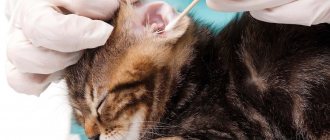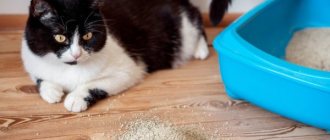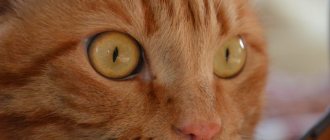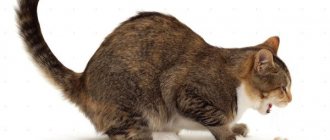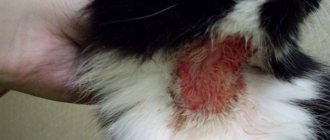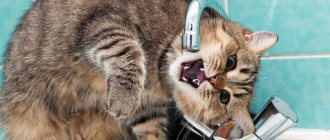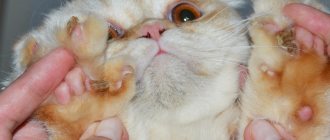Cats are one of the most adorable creatures man knows. For many, they are like living toys, good conversationalists and friends. However, these cute animals have a drawback - a specific smell from urine. Yes, cat lovers can turn a blind eye to tattered walls, furniture and curtains, begging and theft of food, and other pranks of their pet, but the persistent “aroma” of cat urine becomes a real test for them. How to neutralize it? Are there effective products that remove the unpleasant smell of cat urine? Is it possible to instill good hygiene habits in cats to permanently get rid of the problem? We will try to answer all questions.
Causes of the terrible smell of cat urine
By origin, cats are steppe and desert animals. They tend to drink little water, which leads to concentrated urine and increased odor. In addition, in unspayed and unsterilized animals, urine is overloaded with hormones and because of this it emits a pungent odor that acts as a warning to other animals.
When urine dries, bacteria attach to it, increasing the stench. Keeping your cat's litter box clean is the best way to kill germs, prevent odor from spreading, and eliminate it instantly.
Sources of unpleasant odor from cats and their prevention
An unpleasant-smelling animal cannot cause disgust; it should alert you. Pathologies in the body can happen at any time. Finding out the cause of the smell in a timely manner and providing assistance will help you quickly deal with the problem.
Odor from wool and leather
Pathological processes on the animal's skin may not be visible due to the presence of fur. In this case, the smell gives away the problem.
To establish the location, you need to examine the animal. It is enough to carry out palpation. Starting from the head with your fingers, moving through the cat’s skin, you need to move towards the tail. If, upon palpation, irregularities are detected, they should be inspected by spreading the hair. In case of pain, the animal will give away the location of the pathology by its reaction to pain.
Upon examination you can identify:
- papules (nodules);
- pustules (ulcers);
- vesicles (air bubbles);
- abscess (limited purulent inflammation);
- phlegmon (not limited purulent inflammation);
- scabs (crusts of dried tissue and purulent masses);
- scales (dry dead tissue).
As a rule, in the initial stages, during the ripening process, there may be no smell. It appears when the tissues are lysed and the purulent masses go beyond the process itself.
Are there cats that don't smell?
If you are planning to have a cat in an apartment, then you will be interested to know that some breeds are less smelly. An example is the Sphynx, which not only rarely marks its territory, but also has no hair, relieving its owners of allergies. But even if Sphynxes are distinguished by the absence of a characteristic cat spirit, this does not mean that their toilet does not need to be changed.
Breeds such as the Toyger, Kuril Bobtail, and Scottish Fold also do not have a strong odor.
Special means
Sometimes this happens: the owners carefully monitor the cleanliness of the cat litter, wash it, clean it, but the smell is still noticeable. What to do if there is a smell from the litter box? In this case, the veterinary industry offers special remedies. Most often they are produced in the form of aerosols. No, you don't need to spray them around the room.
Their operating principle is based on enzymes and enzymes that are included in the composition. They dissolve uric acid crystals, while reliably locking away the unpleasant odor. Just a few sprays are enough and the heavy spirit will leave your home.
It is very important that most of these products are absolutely safe for pets and do not cause rejection or damage to their sense of smell.
Advice. If you choose this option, be sure to read the reviews before purchasing. Recently, cunning businessmen have thrown a lot of fakes onto the market that do not give any effect. Buy only proven products from well-known brands. By the way, their price range is quite wide. And follow the instructions strictly! After all, this is an enzyme preparation, and not a home air freshener.
How to eliminate the smell of a cat
A veterinarian can help discourage your cat from urinating outside the litter box and prevent frequent relapses. Let an experienced doctor examine your pet to rule out possible health problems. If your pet is completely fine, but continues, for example, to shit in flower pots, put orange peels or pine cones there. Any strong smell that repels cats is a deterrent. Pet stores sell special anti-mark sprays that work well and help remove the consequences of cat tricks.
What to do if your cat smells bad
First of all, rule out natural causes of unpleasant odors on cat fur. Wash the animal, change its collar or even
take it off. Examine the oral cavity; sometimes tartar is very difficult to detect. If you do not see outward signs of dental damage, contact your veterinarian.
You should also consult a doctor if you notice the smell of acetone or ammonia. At the clinic, the animal will be tested and diagnosed. In some cases, this may include cytology or biopsy. You should not self-medicate, as this can significantly shorten the life of your pet. For the same reason, try to pay attention to the appearance of foreign odors in a timely manner, because it may indicate a serious illness.
Reasons for “bad” behavior
The main factor behind cats urinating frequently outside of the litter box is stress. It can be caused by other pets or the arrival of strangers. The cat must feel safe and at peace, only then can the problem be solved.
Reward your cat every time she uses the litter box to go to the toilet. Remember to clean and wash it with disinfectant on a regular basis. Each animal, if there are several of them, should have its own cat litter box. You might even consider storing an extra tray.
To remove odor, it is fundamentally recommended to castrate the cat and sterilize the cat.
Why does my cat leak fluid from her anus?
The main reason that provokes discharge from the anus in a cat is inflammation of the paraanal glands.
It has been noted that long-haired pets are more susceptible to this disease than their short-haired relatives. The inflamed area on the butt gradually increases in size, and pathological exudate accumulates inside the gland. If therapy is not started in a timely manner, a bacterial infection occurs, which threatens suppuration and the development of sepsis.
Other causes of inflammation of the anal area in cats
This symptom occurs in an animal due to the presence of parasites.
- Injuries. If a kitten or an adult cat has an injured anus, after using the toilet, or rather, each act of defecation, the wound bleeds. If the damage is not eliminated, the risk of bacterial infection and progression of inflammation increases.
- Worm infestation. Parasites lay their eggs on the outer skin of the anus. This causes itching in the animal, which the pet tries to relieve by any means. As a result, delicate skin becomes irritated and can become inflamed.
- Obesity. Disruption of metabolic processes in the body contributes to the development of various diseases of the digestive system, including the intestines. Improper digestion of food leads to constipation, which is often accompanied by the release of mucus during and after bowel movements. In a sterilized cat, obesity is a common problem that is important to begin to combat in a timely manner.
- Incorrect feeding. If an animal eats dry food, but does not consume enough liquid, the feces become dense and, when passing through the intestines, injure it, causing inflammation and the appearance of pathological discharge.
- Congenital disorders. In a newborn kitten, bloody ichor from under the tail may be a sign of congenital anomalies in the development of the gastrointestinal tract.
- Oncology. Restlessness during bowel movements, mucus and heavy bleeding from the anus, loss of appetite, sudden weight loss - all these are signs indicating the development of a tumor in the large or small intestine.
Tips on how to get rid of the smell of cat urine
Cat urine can sometimes be very difficult to detect on carpets, furniture and upholstery. Then you can purchase an ultraviolet flashlight or lamp, which are sold in pet stores. The area marked with urine will be illuminated, allowing you to quickly find the source of the odor and remove the stain.
Cat urine is easily absorbed with paper towels. It needs to be removed as soon as possible. If the urine has already dried, wet the stain with water and blot thoroughly with a napkin.
What other products can remove the persistent smell of cat marks?
- In an apartment or other confined space, a solution of potassium permanganate (potassium permanganate) is used to remove odors, which is applied to a particularly “affected” area.
- Many housewives add a few drops of iodine to water to neutralize odor.
- Regular baking soda, as well as salt, perfectly remove the smell of urine and the yellow color on the floor.
- Depending on the strength of the smell, alcohol, vodka, white vinegar with water (1:4), and hydrogen peroxide are used. However, these products should not be used on lacquered furniture and should be used with caution on colored upholstery.
- Old urine odor is removed with chlorine or bleach.
- The soft fabric of the sofa can be treated with lemon juice diluted in half with water.
In exceptional cases, when the stinky smell from the apartment does not go away for too long, repairs have to be made. Clothes or upholstery on upholstered furniture may require professional dry cleaning.
Do not wipe the stain with products containing ammonia, as the substance itself has a strong, specific odor, which, in turn, may encourage your cat to mark the area more actively.
I like 0
Cat Urine smell Cat smell Ventilation Cat litter Cat Bad smell Disinfection Cleaning
Related Posts
leave a comment
Only 2 comments.
Elena
with us 1 year, 5 months
2019-05-20 01:32:03After every wash of the tray, I treat it with odorgon gold, and there is no unpleasant smell left at all. By the way, it is harmless for cats.
What can you do at home?
If your cat has bad breath, it is important to understand that treating the animal at home is dangerous. However, the owner needs to examine the pet and try to help him, if possible.
To remove the stench, the root cause must be eliminated:
- If there are ulcers and redness, treat the oral cavity with a solution of Miramistin or a product containing chlorhexidine.
- If plaque is detected, your teeth will need to be cleaned. This can be done with a brush and paste or by wrapping a piece of gauze around your finger. However, if the animal is not accustomed to hygiene from childhood, most likely difficulties cannot be avoided. As an alternative to toothpaste, you can consider special toys. Severe dental plaque can only be removed by a veterinarian.
- If a foreign object is found during inspection, you can try to pull it out.
Healthy teeth - fresh breath
Problems with gums and teeth can arise due to previous infection, malocclusion (congenital pathology, breed characteristic), or improper care of the pet’s oral cavity. According to veterinarians, only about 5% of owners regularly brush their cat's teeth. As a rule, adult pets over 5 years of age, Persian cats, and kittens with pathologies more often suffer from oral ailments.
If a cat has a tooth or gum pain, the pet chews with caution, eats more slowly than usual, chews on one side, rubs the sore side of its muzzle against the furniture, and holds its head at an angle. When the pain is severe, the cat suddenly screams sharply, cannot close its mouth, drools, and does not allow itself to be stroked on the head.
Owners forget that the domestic cat does not eat the way nature intended it to eat. Wild cats tear their prey with their teeth, swallowing small pieces. Domestic cats often eat soft food - minced meat or finely chopped boiled meat/fish, cereals, eggs, cottage cheese, etc. Soft food leaves plaque on the gums, pieces get stuck between the carnivorous teeth, not intended for chewing. Leftover food rots, putrefactive bacteria destroy the enamel and lead to gum inflammation. Plaque covering the enamel eventually turns into hard tartar, which injures the gums. In this case, an unpleasant odor from the pet’s mouth is inevitable, and soon more serious problems will appear - stomatitis, gingivitis, periodontitis, caries, etc.
Dry food is also not a panacea. Although hard granules mechanically remove some of the plaque from the enamel, small particles still remain between the teeth and rot in the same way as soft natural products.
The cause of a strong odor may be an ulcer, injury, or tumor in the mouth. Some viruses lead to ulceration of the mucous membranes, destruction of enamel, and proliferation of gum tissue. To prevent or promptly detect the onset of the disease, the owner must:
- regularly examine the cat’s oral cavity;
- feed your pet correctly (many books have been written about this, you can consult a breeder or veterinarian);
- Brush your cat’s teeth once a week or regularly contact a veterinarian to remove plaque and tartar (mechanically, ultrasound, under anesthesia or without, if the cat is calm).
A veterinarian will help you get rid of bad breath from your pet. After the examination, the doctor will heal the diseased teeth, remove the stone and treat the gums with an anti-inflammatory gel (for example, Metrogil-dent). In case of severe inflammation, a course of antibiotics and immunostimulants will be required. For tumors, ulcers, tissue proliferation - surgical intervention.
